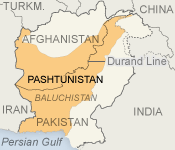IT has been just over 20 years since the collapse of the Soviet Union and the last great additions to the world’s list of independent nations. As Russia’s satellite republics staggered onto the global stage, one could be forgiven for thinking that this was it: the end of history, the final major release of static energy in a system now moving very close to equilibrium. A few have joined the club since — Eritrea, East Timor, the former Yugoslavian states, among others — but by the beginning of the 21st century, the world map seemed pretty much complete.
Now, though, we appear on the brink of yet another nation-state baby boom. This time, the new countries will not be the product of a single political change or conflict, as was the post-Soviet proliferation, nor will they be confined to a specific region. If anything, they are linked by a single, undeniable fact: history chews up borders with the same purposeless determination that geology does, as seaside villas slide off eroding coastal cliffs. Here is a map of what could possibly be the world’s newest international borders.
Maps of these possible new borders
Mali Breaks Up
At least a half-dozen Tuareg rebellions in the past century predate the recent declaration of Azawad as an independent state in Mali’s vast northern Sahara territory. Even if Berber nationalism now seems to have taken a back seat to radical Islam, the split seems irreparable. The only question is which other Berber movements might gain inspiration from Azawad, like those of Western Sahara, who remain trapped in a stalemate with occupying Morocco, or perhaps a nationalistic Kabyle movement, defiantly marking its distinctness in a mountainous zone near Algeria’s Mediterranean coast.
Belgium (Finally) Splits Up

Divided along linguistic lines between French and Flemish speakers, the once-unified, French-dominated country has been drifting toward a split for decades. Observers point out that if it weren’t for Brussels, a separate, officially bilingual but mainly Francophone enclave inside the Flemish-speaking north, Belgium would have split up long ago. Strangely, it is “Brussels” — in its role as shorthand for the European Union — that could facilitate a divorce. As Europe integrates, national borders will become less important than cultural and ethnic lines.
Congo Splinters
There already are two Congos — one a former French colony, the other Belgian, their capitals facing each other across the eponymous river. Given how the countries were cobbled together for imperial convenience but with ethnic incoherence, there could be many more. The larger of the two, with its capital at Kinshasa, is the Democratic Republic of Congo. Though on the map it is the second-largest country in Africa (the largest being Algeria, after the breakup of Sudan), the state is so weak that some experts question whether it can be said to substantively exist at all. The provinces of North and South Kivu, in the country’s east, have drifted into the orbit of Rwanda, which maintains a troop presence there. And the copper-rich Katanga Province in the south could attempt to spin off as well, perhaps fusing with its neighbor, the more stable and prosperous Zambia. The Congolese patchwork might be better redefined by resource corridors than mixed ethnicities.
Somalia’s Breakup Confirmed

With a restoration of national government planned this year, many believe this is Somalia’s best chance to emerge from decades as the world’s poster child for state failure. But Puntland and Somaliland, the eastern and western thirds of the country, want no part in the party as they continue to build their own economies, largely around pirating, and operate their own administration and police forces.
Alawites Go Solo
It’s getting harder to predict what Syria will look like once the dust of the civil war has settled. One thing seems certain after months of bloody, sectarian strife: it won’t look like the old Syria. Perhaps it will resemble its erstwhile client state Lebanon: religions exerting squatters’ rights in the empty shell of central government. Or perhaps Syria will revert to the ethnic puzzle laid out by the Fre

nch: separate states for the Druse and the Alawites, and city-states for Damascus and Aleppo. The Alawite state, home to the dominant sect in Bashar al-Assad’s Syria, would control the fertile, mountainous coastline and is perhaps the most viable contender for separate statehood.
The Arabian Gulf Union

